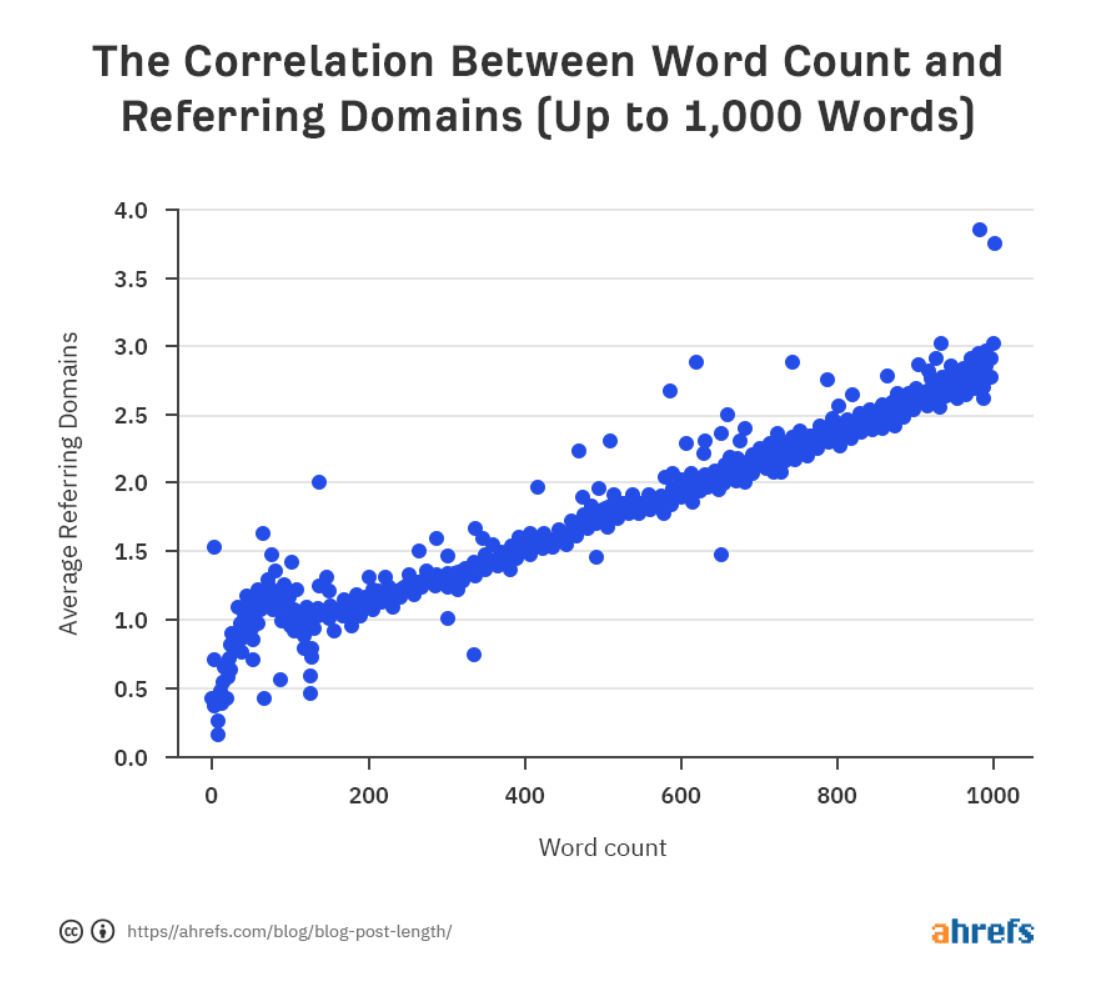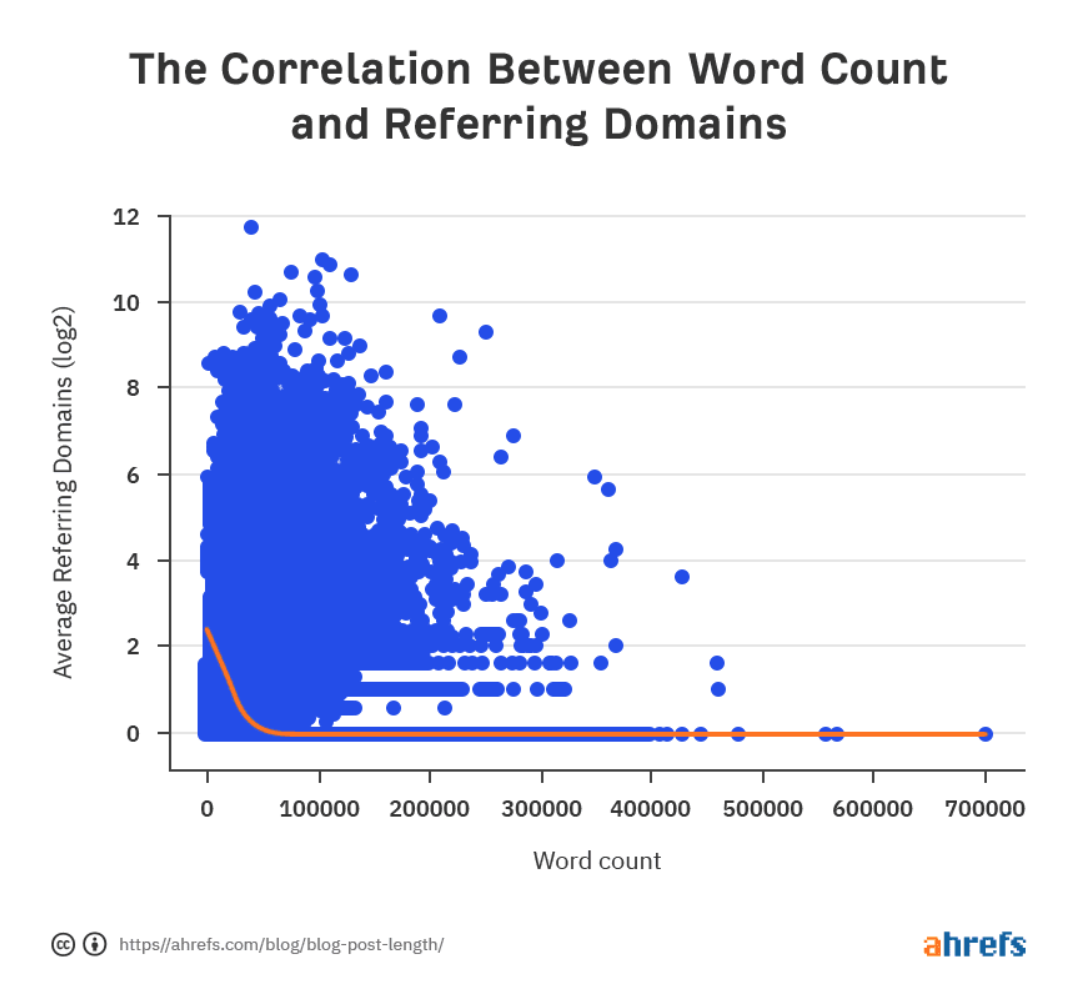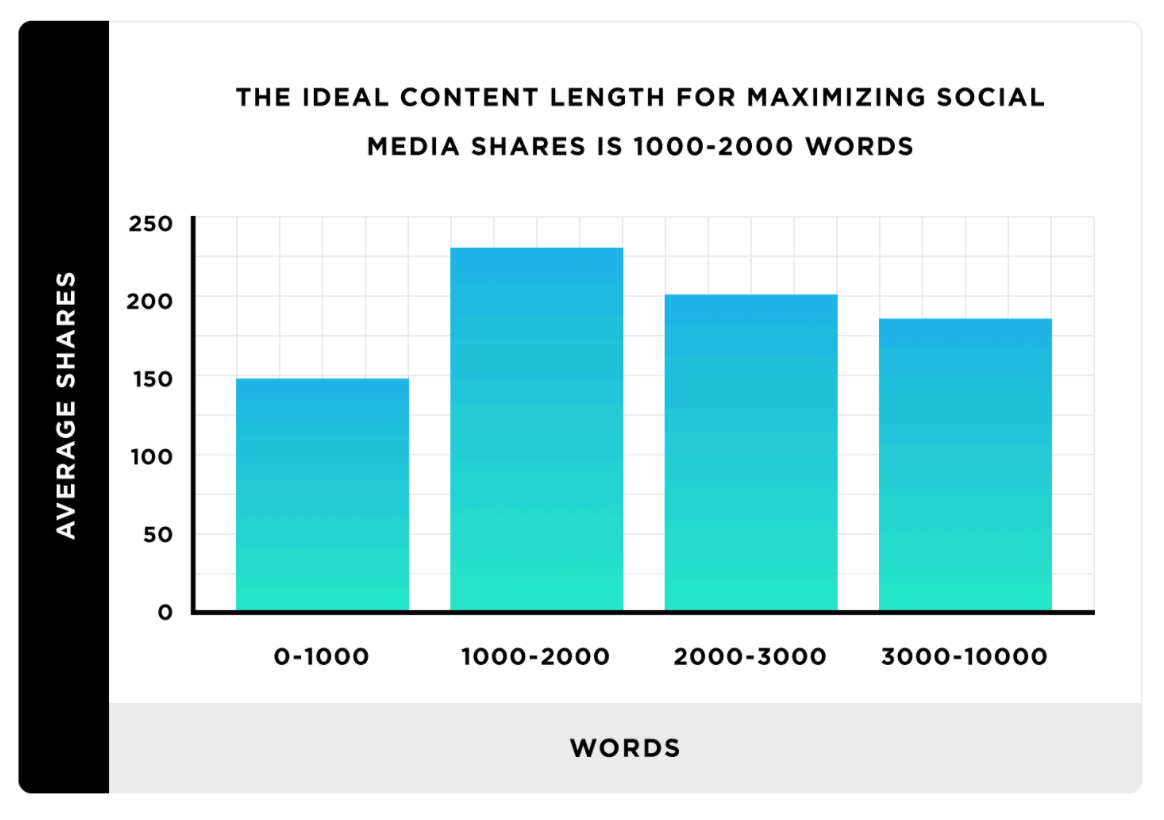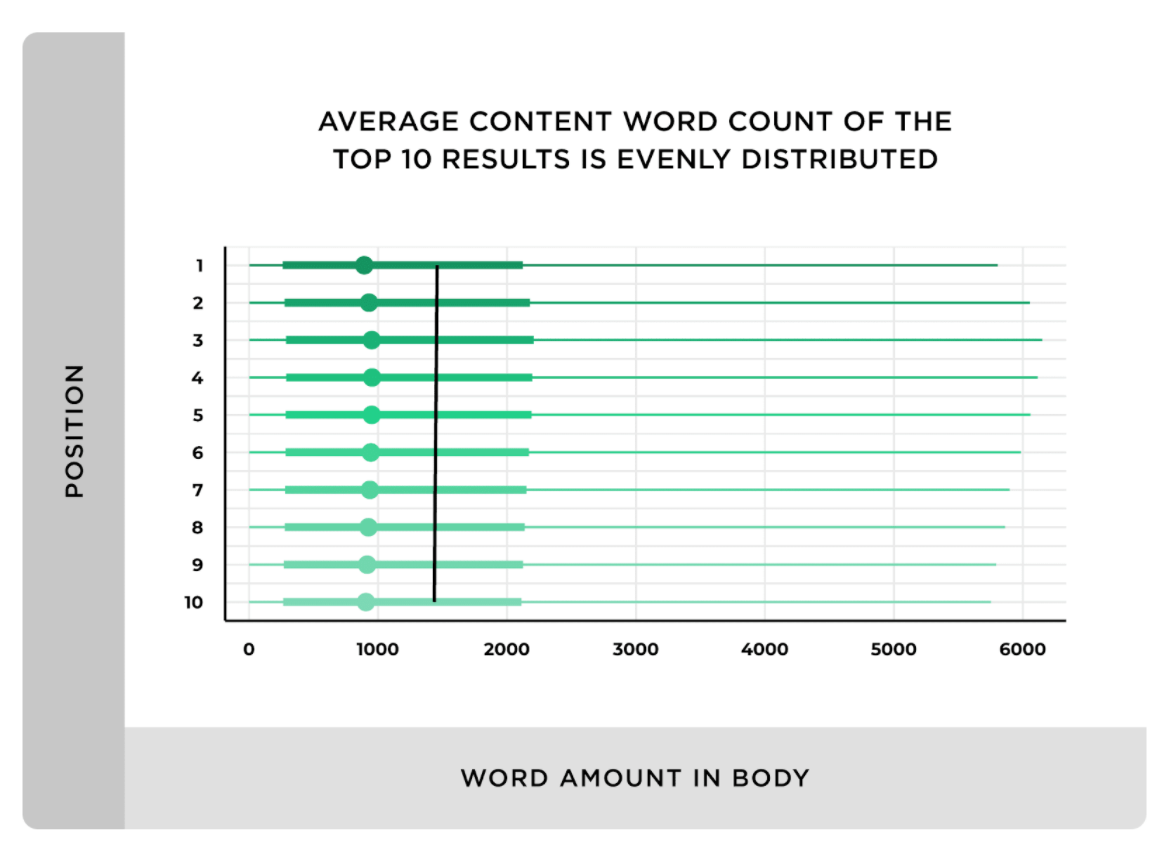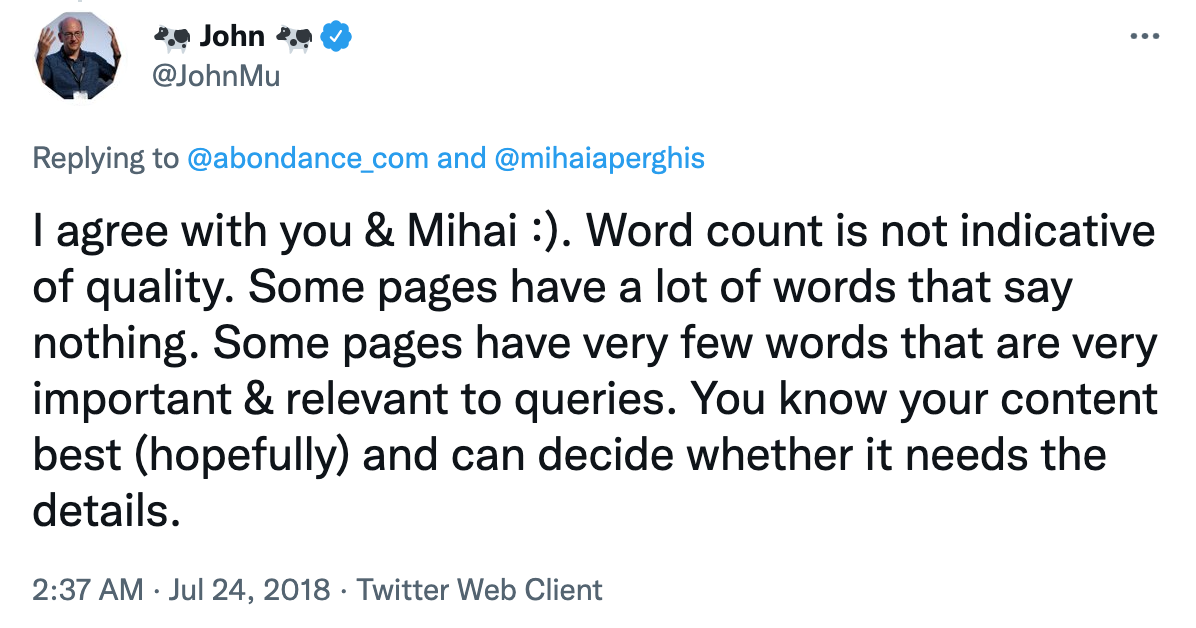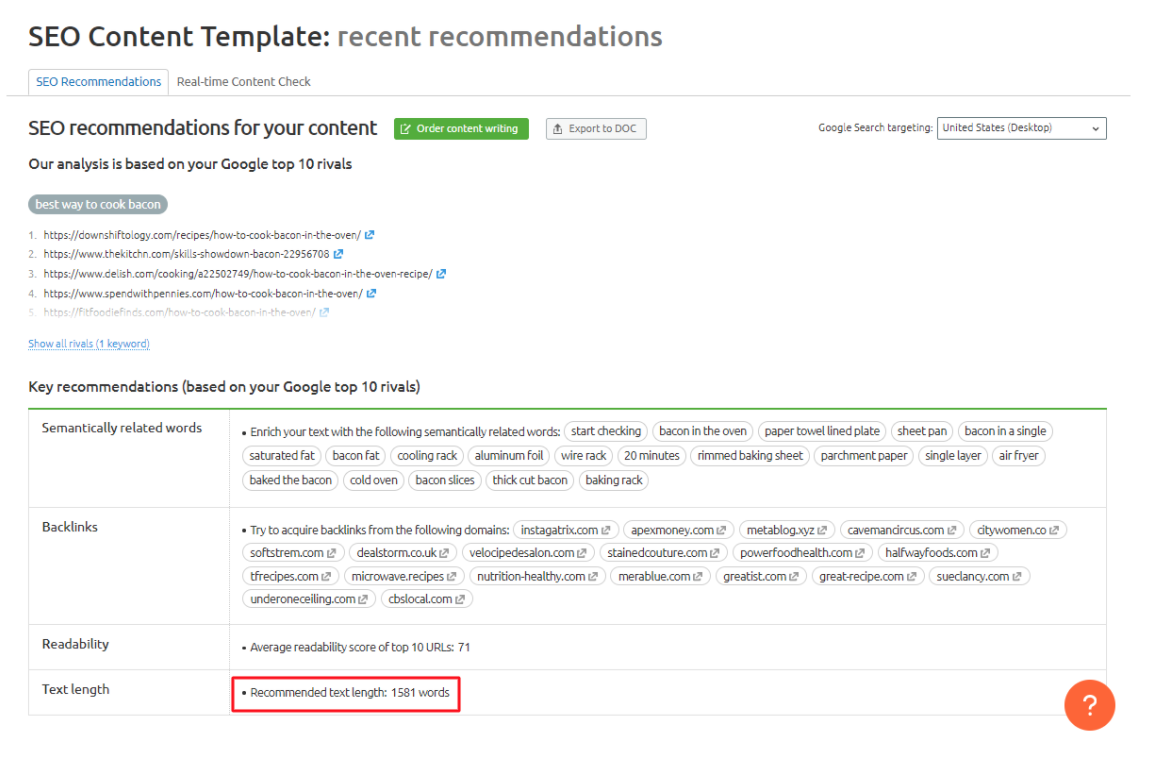“What’s the ideal blog post length?”
“How much should I spend on PPC ads?”
“Which social platform is best for my business?”
These three marketing questions are invariably answered with the accurate, if ultimately unhelpful, phrase: “It depends.”
In this article, we’re going to take a shot at providing a meaningful answer to the first of those three questions.
To do it, we’re going to lean on a wealth of recent data from some of the biggest names in SEO and social media.
And to make our answer as actionable as possible, we’ve broken it down into four common blogging objectives:
- Lead generation
- Link-building
- Social shares
- Organic traffic
Let’s dive in:
1. The Ideal Blog Post Length For: Lead Generation
Lead gen is a common content marketing goal, especially for B2B brands.
Those brands aren’t necessarily looking to drive a ton of traffic.
After all, if you have a small audience and a niche product, why bother publishing blogs that attract tens of thousands of readers? Only a tiny proportion are ever going to buy from you anyway.
So it stands to reason that blog posts written from a lead generation perspective might look a little different to those predominantly written with SEO or social shares in mind.
Fortunately, HubSpot has some data to help us out.
Analyzing the 50 posts that generated the most leads in 2019, HubSpot discovered they had:
- An average (mean) length of 2,569 words
- A median length of 2,529 words
Interestingly, those totals are about 250-400 words longer than the average and median lengths of HubSpot’s most-read posts from the same year.
What Does This Tell Us?
Firstly, it indicates that ~2,500 words is a sweet spot for blogs written to bring in leads.
Secondly, it could suggest that longer content is better for lead generation because it helps you appear more authoritative, knowledgeable, and trustworthy.
But as with all studies, it’s important to consider the limitations of the data.
Specifically, this study exclusively looks at HubSpot’s own blog posts. If your audience is nothing like HubSpot’s, you might not see the same results.
2. The Ideal Blog Post Length For: Link-Building
Backlinks are highly valuable from an SEO perspective.
Search engines effectively see them as a trust signal from one site to another.
In other words: if we link to your website, Google thinks we’re saying, “These guys know what they’re talking about.”
Generally speaking, the more links you have from high-authority websites, the better chance you have of ranking strongly in search.
Which explains why marketing teams invest so much time and effort in acquiring backlinks.
But does word count affect the likelihood of your blogs attracting links? And, if so, what’s the ideal blog post length for link-building?
Ahrefs analyzed about 900 million pages and found there is, indeed, a strong positive correlation between word count and the average number of backlinks from unique websites:
So more words = more links, right?
Not necessarily.
The eagle-eyed among you will have noticed the above graph cuts off at 1,000 words.
There’s a reason for that: the average number of backlinks per page actually starts to decrease once you bust through the 1,000-word mark:
What Does This Tell Us?
If you’re looking to write blog posts that attract a ton of backlinks, it looks like 1,000 words is the ideal length.
Why? Well, we don’t know for sure.
However, Ahrefs theorizes that longer posts — that is, those with more than 1,000 words — are more likely to dilute the most link-worthy stuff with lots of less-relevant information. That makes it harder to find the really relevant bits.
Think about it.
This blog is relatively short, at about 1,300 words, and it’s 100% focused on the topic of the ideal blog post length.
So if you were collating a bunch of resources on blog post length, you might link to it.
But you might not link to a 5,000-word resource that discusses every possible element of writing the perfect blog post — from meta descriptions, to H2s, to calls-to-action — if you’re primarily interested in answering the question of ideal blog post lengths.
3. The Ideal Blog Post Length For: Social Shares
From 15-second TikToks to 280-character tweets, social media is rarely the place for long-form content.
So how does blog post word count affect social shares? Are we incapable of sharing anything that takes us more than a few seconds to consume?
Not according to Backlinko.
By analyzing 912 million blog posts, Backlinko discovered that longer posts actually attract substantially more social shares than shorter content:
But, as ever, it’s not quite that simple.
While posts of 1,000-2,000 words generated an average of 56% more social shares than those of <1,000 words, shares dropped off markedly beyond the 2,000-word mark.
What Does This Tell Us?
If social sharing is your goal, aim for between 1,000 and 2,000 words.
Again, we don’t know exactly why that would be, and Backlinko doesn’t care to speculate.
But if we had to guess, we’d suggest it’s similar to the backlinking issue: posts of 1,000-2,000 words might be more likely to provide sufficient depth on a single, shareworthy topic, without veering off on tangents.
4. The Ideal Blog Post Length For: Organic Traffic
Admittedly, organic traffic and link-building are closely related goals.
After all, building links is ultimately about ranking higher in search.
However, Google is thought to use more than 200 ranking factors, the majority of which have nothing to do with backlinks, so we thought organic traffic deserved its own section.
Again, the folks at Backlinko have some useful data for us.
In a separate analysis of 11.8 million Google search results, Backlinko found that the average length of a page ranking in the top 10 of SERPs is 1,447 words:
What Does This Tell Us?
Before you start trawling through your blog posts, furiously adding or deleting until they’re all exactly 1,447 words long, there’s one very important thing to bear in mind:
Backlinko’s research found absolutely no direct relationship between rankings and word count.
Take a closer look at the above graph and you’ll see the average page in position #1 is actually slightly shorter than positions #2-9, and about the same length as position #10.
So a 1,447-word blog post might help you reach page one, but it won’t help you climb from #10 to #1.
What Does Google Say About the Ideal Blog Post Length?
Google isn’t exactly known for giving hard-and-fast answers on how its rankings work, and the issue of blog post length is no different.
To be fair, you can hardly blame them.
If Google definitively told us that the perfect blog is nine words long, that would be the length of every single blog post. So length would effectively cease to be a ranking factor for blog posts.
However, one thing is clear from the search engine giant’s previous advice: as far as Google is concerned, a 1,000-word blog post isn’t automatically better (or worse) than a 500-word post.
Or, as Google’s John Mueller put it:
At the same time, his statement doesn’t mean blog length is totally irrelevant, or that you should always publish the absolute bare minimum number of words.
It’s all about intent.
If you’re searching for tomorrow’s weather forecast, you’re probably not looking for a 2,000-word essay.
But if you want to learn about the history of social justice movements, a couple of sentences likely won’t satisfy your query.
What Do SEO Tools Say About the Ideal Blog Post Length?
As we’ve already seen, there’s a lot of vagueness in the world of search engine optimization.
Despite this, certain SEO tools — such as SEMrush and SurferSEO — can bring some much-needed specificity to the question of blog post length.
If you’re targeting a specific keyword, those tools will analyze the content that’s currently ranking strongly for your chosen term, then figure out the word count you should be aiming for (plus lots of other elements, like the number of images, headings, and paragraphs to include).
For instance, here we can see SEMrush recommends writing 1,581 words for a blog targeting the keyword “best way to cook bacon.”
Nice and specific, right?
Final Thoughts
There is no “ideal blog post length.”
In SEO, as in life, context matters. For some queries, a 500-word blog might suffice; for others you might need five or even 10 times as many words to fully match the searcher’s intent.
As a rule of thumb, start every blog post with the goal of communicating your desired message clearly, concisely, and without any fluff.
If you can achieve that, you’ve got the best chance of satisfying your audience (and Google).
Let’s be honest, writing amazing content is hard work. Want someone to lighten the load? Get in touch with Content Conquered!

